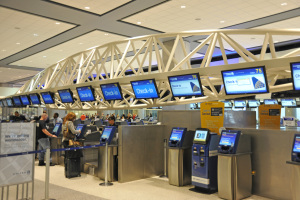Your love for travel. The joy of seeing the world. Crossing the country to see your grandkids.
While you may slow down as you grow older, it doesn’t mean your travel plans always need to stop. I hope some of these senior travel tips may make your travels equally rewarding by helping you with some of the challenges you may encounter.
RELATED:
GUIDE: 9 Tips When Traveling With An Alzheimer’s Dementia Companion
My Top Travel Gear Recommendations
GUIDE: Are You Allowed To Bring Alcohol On A Plane?
GUIDE: Traveling with Cremated Remains – TSA and Airline Rules
GUIDE: Are You Allowed To Smoke E-Cigarettes On A Plane?
1. Allow For More Time
Ideally, don’t hesitate to allow for twice the time to get from your front door to your seat, whether it’s on a plane, train, bus, or otherwise. Let the folks in the big rush go on by you, as you can remain calm and collected at your pace. For a longer trek, such as navigating around an international airport terminal, don’t hesitate to find a seat and take a short break.
2. Have Travel Documents Ready
Save time and hassle by having your travel documents and identification all in one place and at the ready. Pre-print your boarding passes, hotel confirmation, train tickets, etc. Then, make a back-up copy of them and your identification to be kept separate from the originals. Another popular option is to email a PDF copy of them all to yourself. Additionally, medical documentation, insurance information and a medication list may be wise to have in an accessible place.
3. Consult Your Doctor
First, are you cleared to travel on the trip you intend to take? And if so, what are your limitations? Are there any special medications, precautions, or travel tips from your doctor, such as compression socks while flying? Ask questions and inform your medical care provider of your plans.
4. Put People To Work For You
Will you need a wheelchair at the airport? Can you board your plane or train early to get settled in? Don’t be afraid to contact your airline or travel agent with your needs for assistance. And do so at least 72 hours before departure to assure you are accounted for.
5. Pack Essentials Close
Keep your essentials close to you, preferably in your personal item carry-on, especially your medications and identification with emergency contact information. Make it a rule to have everything you need for your travel time +1 day with you in your carry-on bag(s). Zip closed Ziploc bags are great!
6. Know The Rules
You can save yourself a lot of frustration and confusion by knowing the rules before leaving, such as your carry-on limitations. Here are some helpful links:
- TSA Carry-On Rules (3-1-1 Rule)
- Traveling with liquid medication
- TSA Screening for Passengers 75 and Older
- TSA Help for Travelers with Disabilities and Medical Conditions
7. Communications
Provide your family, friends, and neighbors with your travel plans and contact information. Confirm your estimated arrival time and place with your destination companions. If you are a no-show, they can start tracing your planned route to see if there is a reason for your delay, such as a late flight. Again, if you’re traveling with a loved one with a cognitive impairment, read my RELATED link above for specialized tips.
8. Do As Others Should Do
Your travel plans may take you out of your routine, so don’t forget the basics: drink lots of water, have an exit plan, ask for help when needed (don’t be shy), take lots of breaks to rest, and take “reverse breaks” i.e. on long flights/rides be sure to walk around every 1-2 hours.
9. Consider Convenience & Cost
Sometimes you’ll find it is completely worth spending a few extra dollars to purchase comfort and convenience. For example, a taxi ride from the airport to your hotel may cost you $40, whereas a private car is $60. So, is it worth $20 more to have the driver meet you at the baggage claim, carry your bags, walk you to the car without a wait, skip the taxi line, and enjoy a safer, cleaner, nicer ride? Probably!
10. Pack Light
Yes, even seasoned travelers still pack too much. Personally, I don’t think I have ever thought to myself, “I under packed!” It may sound extreme, but my practice is to plan the clothing I’ll need for a trip, and then pack half! For longer trips, consider purchasing your toiletries as your destination. Another idea is to box and ship items for longer stays, freeing up your baggage and savings on possible extra baggage costs. For example, bringing the grandkids some gifts? Don’t pack them, ship them.
11. Where’s the Medical Facility?
Last but not least, plan for the worst, hope for the best. Whether you’re visiting a major metropolitan area or a remote rural town, be sure to inquire where the nearest hospitals are in case of emergency.
Travel Safely!
____
@travelblawg
facebook.com/travelblawg
Subscribe in the sidebar!
Disclosure of Material Connection: Some of the links in the post above are “affiliate links.” This means if you click on the link and purchase the item, I will receive an affiliate commission.






Very useful. What I would really like to see is how retirement changes the miles/points game (especially new credit card bonuses). I’m wondering if I should try for a bunch before that time.